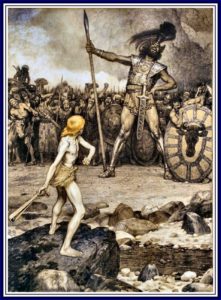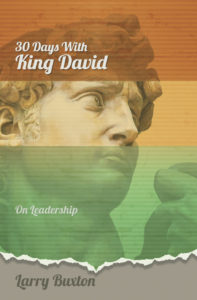
If you were playing a word association game about people in the Bible, and you said, “David,” my odds would be on your partner saying “Goliath.” David and Goliath are associated like … well, like Cain and Abel, Mary and Joseph, Adam and Eve, Hall and Oates, and so on. You get the idea.
Most of us know the basic story of young David felling the giant warrior with a rock from his slingshot. It inspires countless rare stories of the small defeating the large and the favored side losing to the upstarts. It’s a synonym for “upset.” But upsets by definition are rare. Planning a victory based on “an upset” is foolishness. Given the choice, we’d rather go into contention with strength and experience than with neither.
I think one thing that tips the confrontation David’s way is David’s vision. David steps onto the battlefield with a clear vision of why he’s there. He’s not seeking personal glory or fame, and he’s aiming higher than improving the reputation of Israel’s army. “I come to you in the name of the Lord of hosts,” he announces, “so that all the earth may know that there is a God is Israel…!” (1 Samuel 17)
David proclaims his vision, his purpose, to everyone assembled there. He has a large vision that is greater than self-aggrandizement. His mission is to prove the existence and favor of God, heretofore simply regarded as another local deity, to all the earth. He acts to demonstrate the unique power of this God who is now aligned with Israel and to have this story be told widely.
Great leaders live by their commitment to a world that is bigger than personal success. Great leaders can draw a line between their individual purpose, the work they do, and the betterment of humankind. They put their energy into work that grows out of their principles and their bedrock values, work that’s so much more inspiring than “It pays the bills.” Great leaders know the significance of what they’re giving their life’s energy to.

Management guru Jerry Harvey tells the story of interviewing a chemist, Harry Tomrose,* and asking him his greatest achievement in his years at the company. Tomrose replied, “I developed a spray that effectively stops odor in athletic shoes.”
Harvey looked at him quietly a few seconds, and the man’s eyes began to fill with tears.
“It’s hell, isn’t it” he said, “having that as a legacy? When my life is over they’ll build me a tomb shaped like a giant aerosol can, and on it they’ll inscribe, ‘Here lies Harry T. Tomrose. He squelched the stench in your socks.’” He was beginning to see his life as a decades-long version of Trivial Pursuit, and it was eating him up. The proverb is right: “Where there is no vision, the people perish.”
Do you have a vision for the person you most want to be? Often companies are ahead of us in having a mission or vision statement. If they do, does it align with yours? If your personal vision is hard to articulate, ponder such questions as – What principles guide your life? What goals are important to you? What do you want people to say about you at your funeral? Can you write an epitaph that’s more inspiring than Harry’s?
David’s vision is that he will reveal the God of Israel to the world. 30 Days With King David: On Leadership is a helpful resource for how to begin or refine your personal vision. Coaching is another one. Character-based leadership requires a strong foundation. Only then can we link our daily work with a purpose far bigger than just our reflection in a mirror.
You can start Leading With Spirit today.
*Not his real name.

